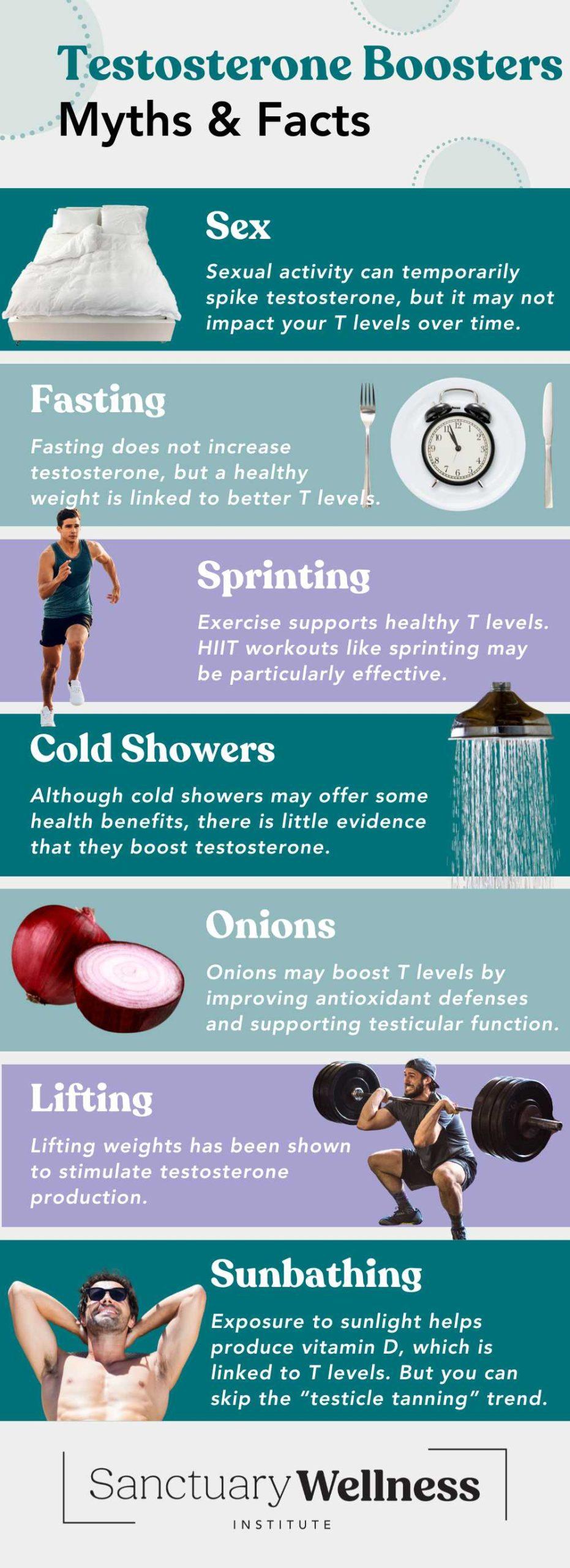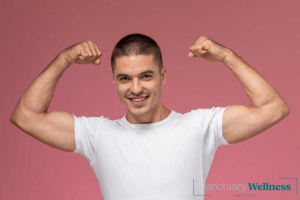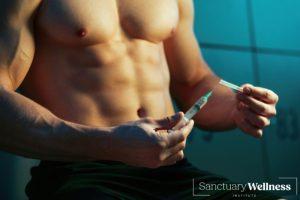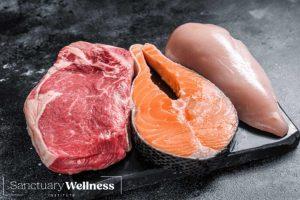- John DiBella
- Published: December 3, 2024
- Fact-checked by Dr. Desiree Granados

When it comes to boosting testosterone, the internet is full of advice. Some of it is useful, some bizarre, and much of it downright misleading. From ancient remedies to modern health trends, there’s no shortage of ideas about what might give your testosterone levels a natural lift. But how many of these methods actually work?
In this blog, we’ll dive into some unconventional, and often misunderstood, methods for boosting testosterone, separating fact from fiction. We’ll explore the potential effects of activities like sex and sprinting, the role of diet staples like onions, and the curious claims surrounding cold showers and sunbathing.
Wondering if you might have low testosterone? Take our quiz to find out!
Sex
Does sex increase testosterone? Yes, but likely only in the short term. Research shows that sexual activity and arousal can cause temporary spikes in testosterone levels. These increases are thought to be part of the body’s natural response to reproduction and attraction.
However, the effect doesn’t last long and may not have a significant impact on your baseline testosterone levels over time. Still, maintaining a healthy sex life is important for overall well-being and can positively influence hormonal balance alongside other lifestyle factors.
Fasting
Does fasting increase testosterone? Not exactly. Fasting isn’t a direct way to increase testosterone, but it may have indirect benefits. Intermittent fasting, for example, can promote weight loss and improve insulin sensitivity, both of which are linked to healthier testosterone levels.
Overeating or carrying excess body fat, especially around the abdomen, can suppress testosterone production, so the weight regulation benefits of fasting may be key. However, pairing fasting with nutrient-dense meals and regular exercise, particularly resistance training, is crucial for optimizing hormonal health.
Sprinting
Does sprinting increase testosterone? Probably. Physical exercise is known to support healthy testosterone levels, and high-intensity interval training (HIIT), which includes sprinting, may be particularly effective. Short bursts of maximum effort followed by periods of rest can stimulate the release of anabolic hormones, including testosterone.
A 2012 study suggests that this type of intense physical activity may produce greater hormonal benefits than steady-state cardio, making sprinting an excellent option for those looking to improve fitness and boost testosterone naturally.
Cold Showers / Cold Plunge
Do cold showers increase testosterone? Probably not. Despite popular claims, there is little scientific evidence to support the idea that cold showers or plunges significantly boost testosterone levels. Cold exposure may offer other health benefits, such as improved circulation, reduced inflammation, and better recovery after workouts, but its effect on hormones appears minimal.
If your goal is to increase testosterone, a well-rounded approach including exercise, proper sleep, and a balanced diet will be more effective than relying on cold showers alone.

Onions
Are onions a natural testosterone booster? Probably. Onions are packed with antioxidants, vitamins, and minerals that support overall health, and some animal studies suggest they may boost testosterone levels by improving antioxidant defenses and supporting testicular function.
While the evidence in humans is limited, onions can still be a nutritious addition to your diet and may contribute to better hormonal balance when paired with other testosterone-friendly habits like regular exercise and healthy eating. They’re not a magic solution, but they can play a small role in a well-rounded approach to optimizing testosterone.
Lifting Weights
Does lifting weights boost your testosterone? Yes. Lifting weights, particularly compound movements like squats, deadlifts, and bench presses, has been shown to stimulate testosterone production. This effect is especially noticeable when training large muscle groups with moderate to heavy weights.
Resistance training also helps build lean muscle mass and reduces body fat, which further supports hormonal health. Regular strength training is one of the most effective ways to naturally boost testosterone, especially when combined with adequate recovery, proper nutrition, and consistent effort.
Sunbathing
Does sunbathing improve testosterone? Yes and no. Exposure to sunlight helps your body produce vitamin D, a nutrient strongly linked to testosterone levels. Low vitamin D is associated with lower testosterone, so moderate sun exposure can be beneficial.
However, the idea of “testicle tanning” or directly exposing your genitals to the sun, which has gained attention online, lacks scientific support and poses risks like sunburn or skin damage. For most people, spending 15–30 minutes in the sun with uncovered arms and legs is sufficient to boost vitamin D levels and, by extension, support healthy testosterone production.
Conclusion
Testosterone plays a vital role in many aspects of health, from energy levels and muscle mass to mood and libido. While there’s no shortage of creative ideas about how to boost testosterone naturally, not all methods are created equal. Some, like lifting weights and sun exposure, are backed by solid evidence, while others, like cold showers or onions, may offer smaller or less direct benefits.
If your goal is to improve your testosterone levels, focus on sustainable lifestyle habits such as regular exercise, a balanced diet, adequate sleep, and stress management. These practices are proven to support overall hormonal health and are far more effective than chasing quick fixes or unverified trends.
How we reviewed this article:
- C. A. Fox, A. A. A. Ismail, D. N. Love, K. E. Kirkham, and J. A. Loraine (1972). STUDIES ON THE RELATIONSHIP BETWEEN PLASMA TESTOSTERONE LEVELS AND HUMAN SEXUAL ACTIVITY
https://joe.bioscientifica.com/view/journals/joe/52/1/joe_52_1_005.xml - Mark Ng Tang Fui, Philippe Dupuis, Mathis Grossmann (2014). Lowered testosterone in male obesity: mechanisms, morbidity and management
https://pmc.ncbi.nlm.nih.gov/articles/PMC3955331/ - A C Hackney, K P Hosick, A Myer, D A Rubin, C L Battaglini (2012). Testosterone responses to intensive interval versus steady-state endurance exercise
https://pubmed.ncbi.nlm.nih.gov/23310924/ - William J Kraemer, Nicholas A Ratamess (2005). Hormonal responses and adaptations to resistance exercise and training
https://pubmed.ncbi.nlm.nih.gov/15831061/ - Chi Chen, Hualing Zhai, Jing Cheng, Pan Weng, Yi Chen, Qin Li, Chiyu Wang, Fangzhen Xia, Ningjian Wang, Yingli Lu (2019). Causal Link Between Vitamin D and Total Testosterone in Men: A Mendelian Randomization Analysis
https://pubmed.ncbi.nlm.nih.gov/30896763/
Current Version
December 03, 2024
Written By
John DiBella
Fact-checked By
Dr. Desiree Granados
Editorial Process
Our Editorial Proces

John DiBella is the co-founder and CEO at The Sanctuary Wellness Institute. His goal is to foster healthier lifestyles to improve individuals’ quality of life and health span through online medical and non-medical services. When he’s not writing health & wellness articles for The Sanctuary, he enjoys hiking, camping, surfing and sailing.







